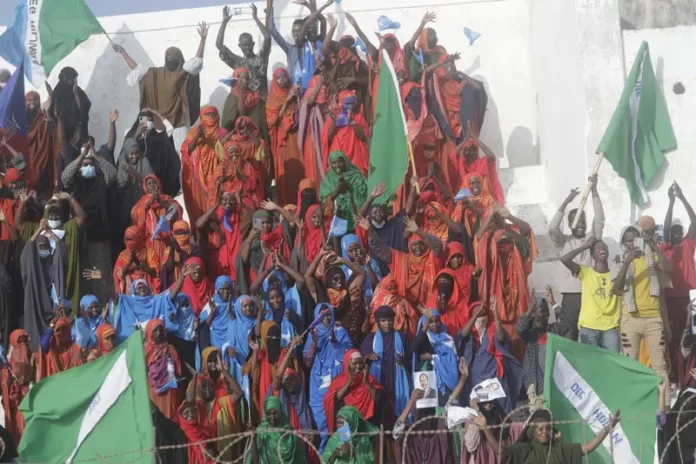Enough was enough. For 13 years, extremists with al-Qaida’s East Africa affiliate had controlled Mohamud Adow’s village in central Somalia, imposing harsh ideology and arresting local teachers and traditional leaders.
Then, word came that Somali forces in a surprising national offensive had expelled the fighters from nearby villages.
A small group of residents sneaked out one night in August to meet with Somali troop commanders and invited them into their village of Rage-El. The 80-year-old Adow was among those taking up arms, joining a local militia fighting alongside Somali forces in rural battles with battered guns.
“The people were living in agony,” said Adow, one of several witnesses interviewed by The Associated Press.
In what is being called “total war” by the government of President Hassan Sheikh Mohamud’s that was elected in May, Adow and others across the Horn of Africa nation are being encouraged to stand up to the al-Shabab extremists who have long embedded in Somali society, exploiting clan divisions and extorting millions of dollars a year from businesses and farmers in their quest to impose an Islamic caliphate.
On Thursday, Somalia’s government announced a “people’s uprising” as it seeks to pressure al-Shabab from all angles, including financial ones.
It’s being described as the most significant offensive against the al-Shabab extremist group in more than a decade. And this time, Somali fighters are in the lead, backed by U.S. and African Union forces.
Al-Shabab’s thousands of fighters have held back the nation’s recovery from decades of conflict by carrying out brazen attacks in the capital, Mogadishu, and elsewhere. Over the years, countries from Turkey to China to those in the European Union have invested in military training and other counterterrorism support.
Last weekend, the U.S. made a small but symbolic donation of $9 million in heavy weapons and equipment to the Somali National Army, whose abilities have long been questioned as it prepares to take over the country’s security from an African Union multinational force by the end of next year.
“We cheer the success achieved by Somali security forces in their historic fight to liberate Somali communities suffering under al-Shabab,” U.S. Ambassador Larry Andre said.
Somalia’s government has claimed more than 1,200 militants have been killed since August, according to a database kept by International Crisis Group analyst Omar Mahmood. Such claims can’t be verified.
One key to the offensive’s progress is a population pushed to the brink by a historic drought. As animals and crops wither and die and millions of people go hungry, Somalis who flee al-Shabab-held communities have described the extremists’ harsh taxation demands.
“They are being rented out like houses; they are telling you that their animals are being taken away without permission,” said Gen. Abdirahman Mohamed Tuuryare, a former director of Somalia’s national intelligence agency who leads the offensive against al-Shabab in the Middle Shabelle region. “Even the child born tonight will be required to pay.”
Residents have also described al-Shabab forcing sons to become suicide bombers and killing people at will.
Tuuryare described a bloody battle last year over the Masjid Ali-Gadud community in which he estimated 200 al-Shabab fighters and “many” soldiers were killed. It took time to persuade wary residents to return to a community so tightly controlled that even Quranic schools were closed. Only centers for training bombers and fighters functioned.
After 15 years under al-Shabab indoctrination, Tuuryare said, residents found it hard to grasp that fellow Somalis had come to help them.
One resident, Ibrahim Hussein, was still adjusting. Al-Shabab fighters forcibly recruited teenage boys and forced women into marriage, he told The Associated Press, and people found guilty of adultery would be stoned to death or publicly flogged.
Still, security was good: “For instance, when a prayer is called, everyone goes toward the mosque without closing their properties. Nobody can touch them. If anyone is found stealing, he or she will face amputation of a limb or limbs,” Hussein said.
BY: APN NEWS


